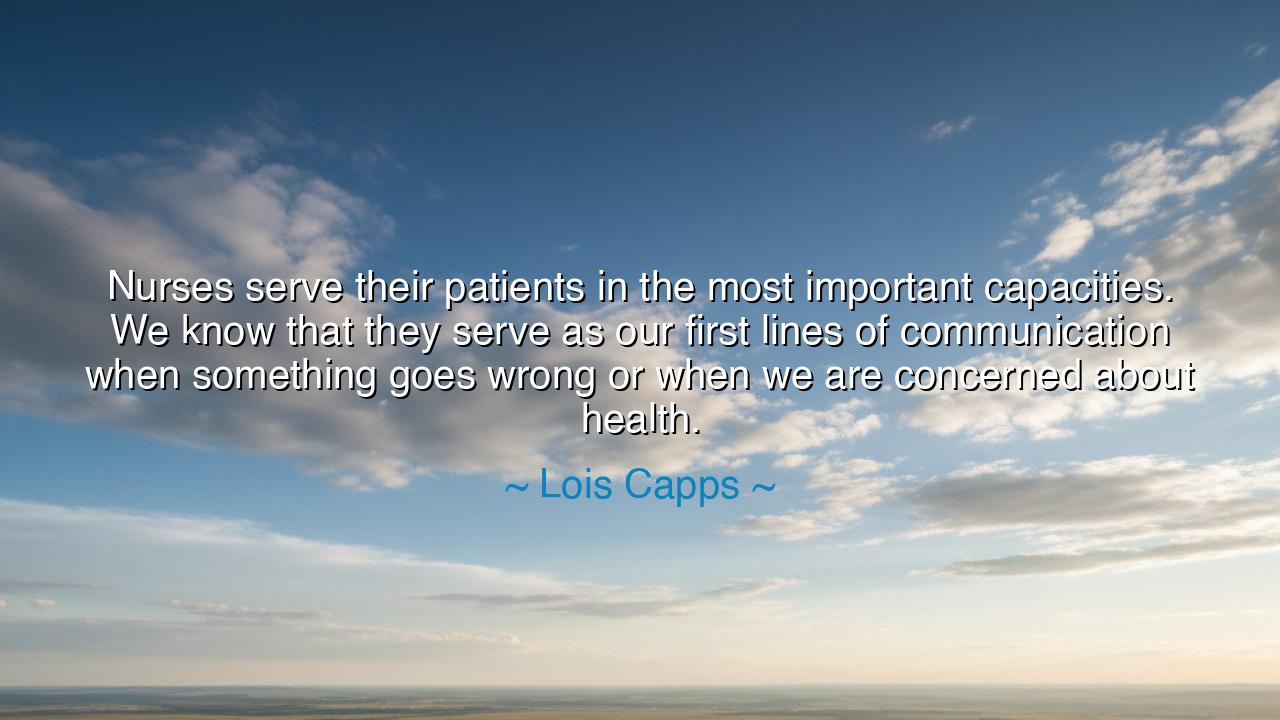
Nurses serve their patients in the most important capacities. We
Nurses serve their patients in the most important capacities. We know that they serve as our first lines of communication when something goes wrong or when we are concerned about health.






"Nurses serve their patients in the most important capacities. We know that they serve as our first lines of communication when something goes wrong or when we are concerned about health," said Lois Capps, highlighting the sacred role that nurses play in the healthcare system. These words echo an ancient truth—that in moments of vulnerability, when we face the uncertainties of life and death, the role of the nurse is not merely functional, but heroic. Like the guardian spirits of old, nurses stand as the first line of defense against suffering, illness, and fear, offering not just their skills but their compassion in the most trying of times.
In the ancient world, the role of the healer was revered as a sacred duty. The Greek physician Hippocrates, often regarded as the father of medicine, recognized the profound importance of those who cared for the ill. While Hippocrates is remembered for his contributions to the field of medicine, he also understood that healing was a collaborative effort, one that required the care and compassion of nurses and other caregivers. In ancient Rome, nurses were seen as the lifeblood of the healthcare system, often tending to wounded soldiers and the sick, providing not only medical care but a kind of emotional support that was vital to the healing process. The healer, whether in a hospital or battlefield, was not alone in their task—nurses were the quiet warriors who made recovery possible.
In the story of Florence Nightingale, one of the most influential nurses in history, we see the embodiment of this truth. Nightingale, who worked during the Crimean War, transformed the role of nurses by introducing systematic sanitation and care for wounded soldiers. She understood that nurses were not just caretakers of the body but of the spirit as well. Her efforts laid the foundation for modern nursing and healthcare, showing that nurses are often the first line of defense, not only in physical recovery but in the emotional and psychological support of patients. Nightingale's legacy proves that the power of a nurse lies not just in their knowledge, but in their ability to listen, to care, and to offer the compassion that can help the human spirit endure even in the darkest of times.
The lesson in Lois Capps' words is clear: nurses are more than just practitioners of medicine—they are the first responders to human vulnerability, pain, and fear. When we fall ill, it is often the nurse we turn to first, for they are the ones who provide the initial comfort and guidance. They are our bridge to the world of healing, translating our fears and concerns into action and care. It is they who stand between us and the unknown, offering not just medical expertise, but the very essence of human compassion.
Consider the countless patients who have faced life-threatening illness or injury. In these moments of uncertainty, it is often the nurse who is there to listen, to reassure, and to make the patient feel seen and heard. A nurse’s presence can transform the experience of suffering from one of isolation and dread to one of hope and human connection. The simple act of holding a hand, of offering a kind word, can be as powerful as any medicine in easing the soul. This is the power of nursing, the quiet, uncelebrated heroism that plays out in hospitals, homes, and clinics around the world.
In our modern world, we must remember the vital role that nurses play in the healthcare system. They are not just technicians or aides, but true healers, acting as the first line of defense when we face sickness or injury. We must recognize and honor their contributions, both in their expertise and their compassion. In gratitude for their work, we must ensure they are given the respect, recognition, and support they deserve.
Let us, then, embrace the wisdom of Lois Capps and the lessons of the ancients: to truly care for others is not simply a matter of skill or knowledge, but of heart. Nurses show us that healing is not just about curing the body, but about tending to the whole person, mind and spirit. Let us offer our respect and support to these vital workers, who stand as guardians of our health and well-being, and let us learn from their example to approach every life, every interaction, with the same compassion, dedication, and care.






AAdministratorAdministrator
Welcome, honored guests. Please leave a comment, we will respond soon